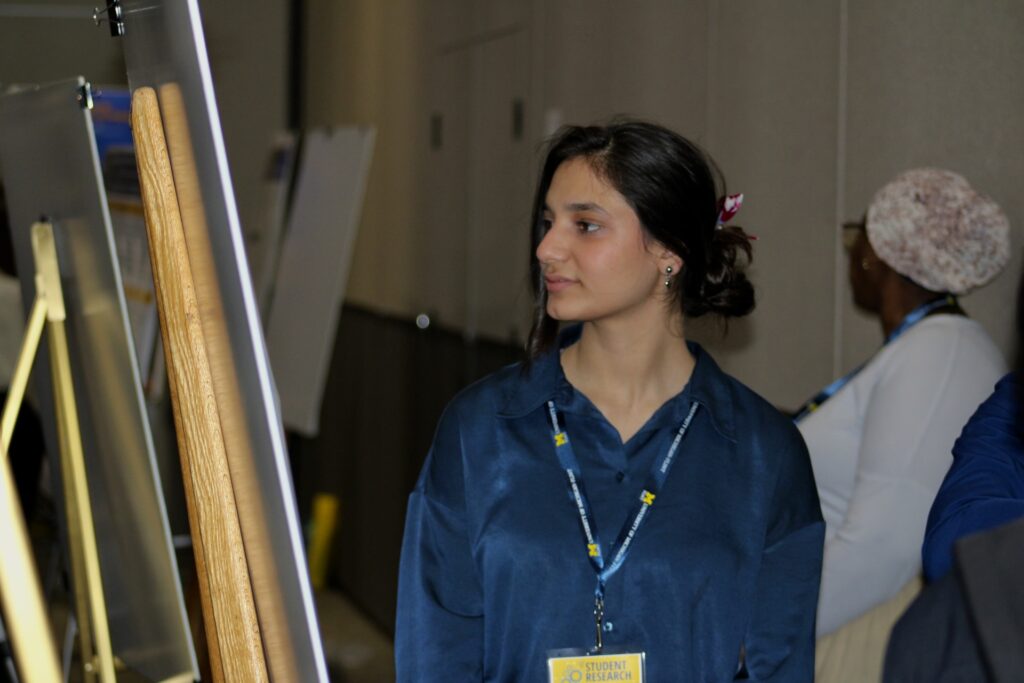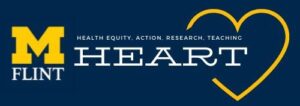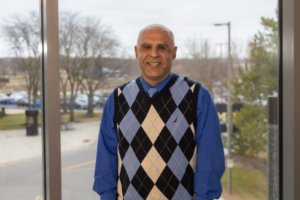
On May 17th, the University of Michigan-Flint hosted the Student Research Conference at the Riverfront Conference Center. This conference was held in collaboration with Mott Community College and Kettering University to allow students the opportunity to present their research. In the remarks offered by the Office of Research, on behalf of the partners, Andre Louis and Ken Sylvester underscored how student-led research is important and has proven, positive impacts on both undergraduate and graduate students. Such impacts include improved learning outcomes, boosted retention, and enhancement in career opportunities. During the conference, there was a mix of poster presentations and oral presentations given by many talented students. I am a recent graduate, but I had never had the pleasure of attending one of these events before. During my time at the conference, I was able to learn about a lot of research that I found interesting.

During the presentations there were a wide variety of topics covered across the medical field, the technical field, and more. In the first round of poster presentations, students presented on topics such as “The Genesee Heat Risk Index: Targeted Tree Planting for Cooling the County” by Hannah Fuentes, “Scenario-Based Design for Consent Mechanics in VR Dating” by Braeden Burger and Devin Tebbe, and “Managing Period Pain and Symptoms of PMS with Mindfulness-Based Clinical Intervention” by Rachell Young, who was advised by Amanda Taylor. In the variety of posters, one I was able to hear the full presentation on was “The Untapped Potential of Neurodivergent Healthcare Providers” by Brooklyn Willhoite. In this presentation, she detailed how many of the most positive characteristics associated with being a healthcare provider are traits commonly associated with people who have autism. She advocated that social barriers and misconceptions should be addressed first to make way for autistic individuals so they can shine in these healthcare settings. She noted that autistic individuals often have traits that fulfill the five competencies of health, and exhibit many traits that fall under the core competency of “Patient-Centered Care” like empathy, kindness, and dedication. I thought this was a very fascinating presentation, and I also hope we might overcome the stigma surrounding neurodivergent people to allow them in spaces suited to the unique ways their brains work.

After the first round of poster presentations, we were allowed to select from a variety of rooms to hear oral presentations of research. For myself, I went into Room G, which hosted a number of presentations touching on topics such as the Flint Water Crisis, diversity and inclusion in Fortune 500 companies, a tool for misinformation online, affordable housing in Michigan, and accessibility’s impact on lives in Flint and Detroit. Presenters included Ari Alnimr, Chase Condron, Brian Coty, Dennis Dedyne, Christopher Ellison, and Manasa Mandla Boya. When discussing diversity and inclusion in Fortune 500 companies, Alnimr and Dedyne focused on 2018. They found that companies with racial diversity among their board of directors often made better decisions, and companies with gender and racial diversity among their board of directors had higher returns on investments. In the top 100, they found that 40% of people serving on the board of directors for these companies were not white men. I think it’s great to see how diversifying boards can overall lead to the companies doing better. Many people have said this for years, but having solid research results is a great way to affirm what people have been saying. I found all of these presentations very interesting and very surprising at times. I came away with a lot of new information on how people are hoping to build better communities.

Following the oral presentations, there was one last round of poster presentations. Again, we were able to see many topics being discussed, but one that I was able to hear the full presentation on was the Global Flint Initiative. This research was done by Mukheshkumar Sivakumar, Vivek Cherlapally, Sameer Bharatam, Raqibul Islam, and Tirumala Tejaswi Masimukku. This research explored the challenges faced by immigrants, asylum seekers, refugees, and international students in Flint and surrounding areas. They report that many of the people within the aforementioned categories struggle with legal complexities, cultural adjustments, economic disparities, and social integration. They want to develop strategies to increase the number of non-native born residents to Flint to help make the city more welcoming and inclusive. As someone who has immigrants in their family and knows people who could benefit from this type of initiative, I’m very excited to see where these researchers go with it, and how they’re able to make it a reality.
Overall, there was much to be learned from this experience about a wide variety of topics that helped deepen understanding and broaden knowledge. I would recommend attending to anyone interested in research, especially student research. It was very formal and provided great food for thought, and great food for the stomach as well. Congratulations to all the students who presented on work well done.




